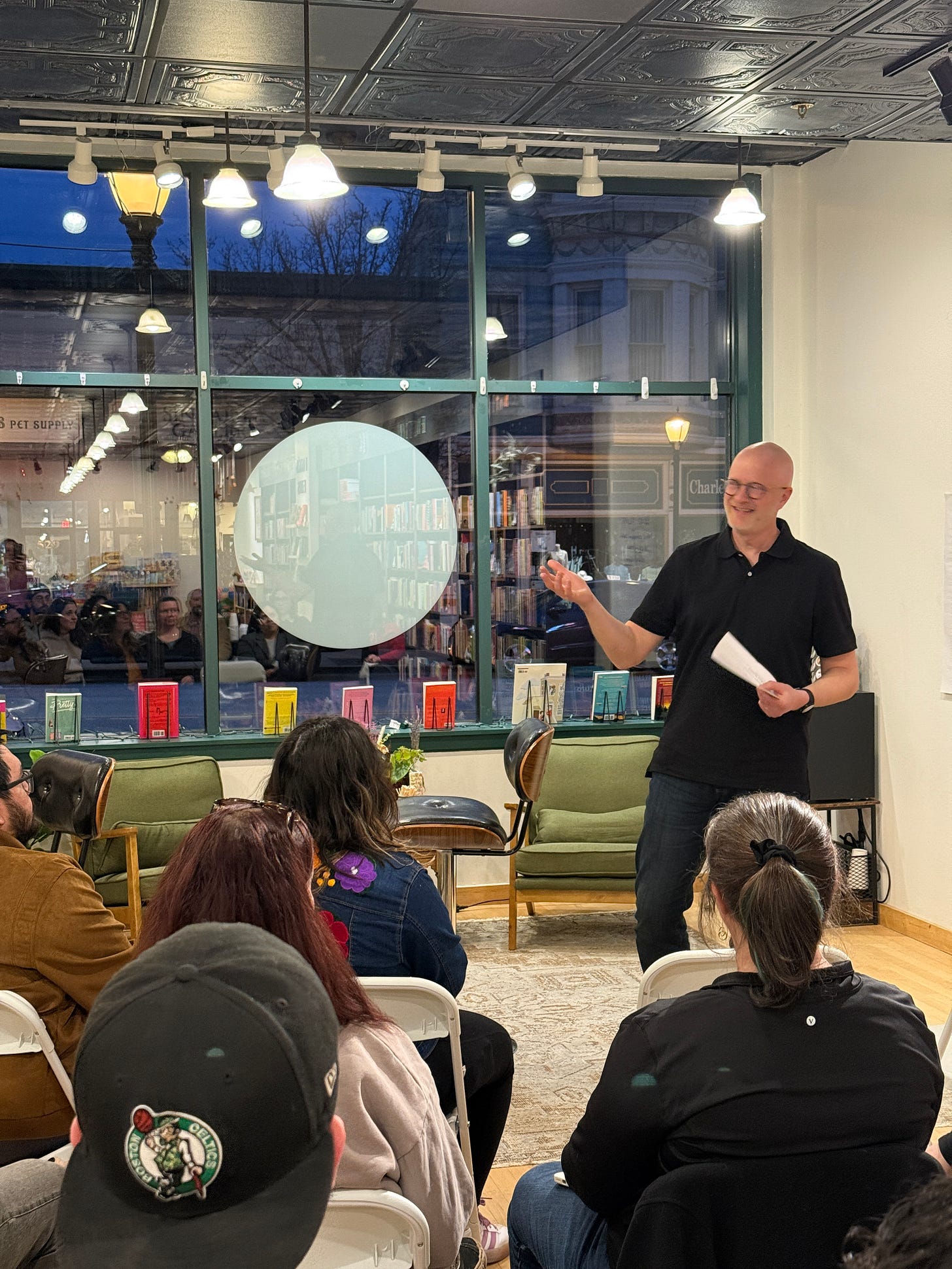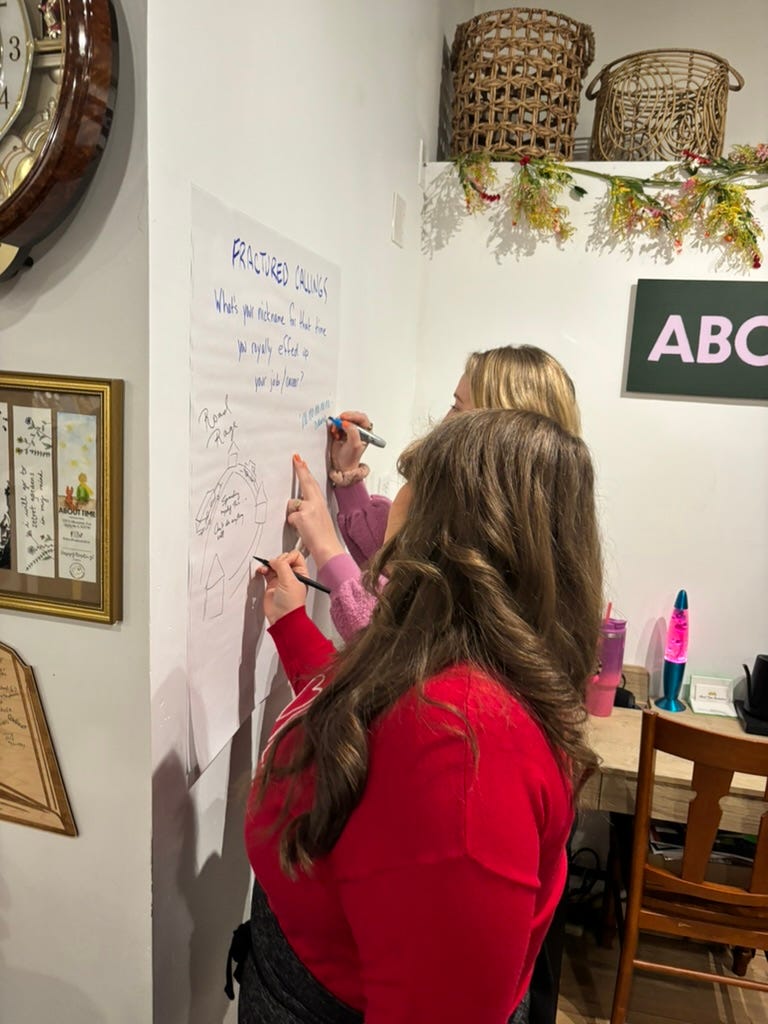How to find the point-of-it-all at work
Read on for some takeaways from last week's Unhappy Hour with a smattering of plucky and thoughtful professionals in a warmly lit bookshop north of Chicago.
It had been a long drive through afternoon traffic on 294N. But now, finally, I had arrived at the About Time bookshop in Libertyville, Illinois. I unfolded myself from the tiny rental car and looked around the sweet and swanky main street. Then I headed into the shop to meet the folks who’d come out for a book talk. We were billing it as the Unhappy Hour.
What struck me about the attenders was how tender they were. They eased into their folding chairs like people settling in for an AA meeting.
Let’s see there was… A guy who’d been working in tech maybe a little longer than he wanted to. A gift shop proprietor, conflicted by callings to care for her kids and her parents. A Gen Xer who had just retired from higher ed and was holding her soul gingerly. A Gen Z just about to take on a new position as a school principal. A millennial now serving as her company’s president. Another one with a relatively new communications position in an energy company.
As you can see, the attenders to the About Time event came primed to help each other.
These people had come because they wanted help with their burnout—or because they were anticipating burnout. They were feeling out the question, “What’s the point of it all?” But as I’ve thought back on the conversations of that night, I’ve come to think that it wasn’t just about finding the point of their jobs; it was also about finding the all behind their points.1
Think of the point as some immediate, probably measurable, reason to do a task. You need the money. You have a deadline. Your manager’s requested it.
Think of the all as the context for that point. Your company’s flourishing. Your family’s livelihood. Your own soul’s vitality. You know, little things like all that.
Here’s this week’s question: How do you hold onto your Point and your All simultaneously?
We’ll look at that question in three segments. First, a workplace trend. Then, an academic study. Finally, I’ll recommend a shift in mindset and behavior.
Photo credit: Delanie, the About Time shop owner
A Trend
Some companies seek to help their employees keep a clear eye on the Point and the All—usually called “work/life balance”—by providing unlimited paid time off.
Unlimited PTO isn’t a new trend exactly, but it’s hit mainstream discussion thanks to a Wall Street Journal article. Here’s how this bright shiny benefit works.
With standard PTO, companies usually offer a set amount of paid time away—say, 3 weeks—which employees spend however they want. And if you leave the company, they have to pay you for unused PTO.
With unlimited PTO, companies give no limits on how much time employees can request—and the company doesn’t have to reimburse unused PTO.
Sounds great, right? Isn’t this a good way to keep your own priorities (your All) front and center in your work? But if you’re a newer employee, you may feel hesitant to ask for PTO beyond what Callum Borchers calls “the magic number” in your boss’s head of reasonable days to request off—which seems to be about 16 days.
Unlimited PTO tends to turn your all into a sub-point.
A Study
A Journal of Communication and Religion article entitled “After Workism” compares Gen Z and millennial professionals to a radical religious movement. Not a cult, exactly. More like a sect. An upstart sect.
You might remember that, in 2019, Derek Thompson said Americans worshipped their work. He noted that “everybody worships something. And workism is among the most potent of the new religions competing for congregants.”2 The point of the job had become “the all” of American life.
Based on Thompson’s analysis, you might think of workism as a mainstream movement like, say, Hinduism or Protestantism. What Thompson doesn’t point out is that mainstream faiths face opposition from within, especially from radical splinter groups that rise up to say, “You’ve lost the point of it all.” The article explores how Gen Zs and millennials are seeking that point and that all in response to the quasi-religion of workism. (Spoiler alert: they use quasi-spiritual practices to do so.)
The article is mostly describing people’s diverse attitudes towards work. But how about if we get prescriptive? Is there a mode/switch to help us keep the All and the Point in hand?
At the event, we did some silent dialogue on the walls of the bookstore, using Bonnie Miller-McLemore’s framework for fractured, unexpected, conflicted, and blocked callings.
A Shift
Let’s do a quick inventory of the Points and the Alls I encountered this past Thursday night at the About Time bookstore.
Some jobs seem to have no Point; they have only an All—like the woman I met the other night who works in a 850,000-employee consulting company where nobody understands how their tiny tasks fit into the overall huge project of the firm. Some jobs turn the All into the Point. These jobs give you a chance to care for something—like the gift store owner who finds peace for her conflicted soul by running a shop. Or the comms guy at the energy company whose work addresses environmental challenges. The All’s the Point. Some jobs have no Point and no All. David Graebner called these “bullshit jobs.” I didn’t meet anybody with a job like that on Thursday night. (Well, maybe the guy in tech...)
Here’s the mode/switch for this week. Imagine the death of your Point. Now, imagine the death of your All. Imagine what happens if either of them simply end. What happens if you lose this thing that seems to you the point of what you’re doing? What happens if you lose the all behind the point?
Imagining the death of your point-of-it-all can give you clarity on the empty metrics and the real “matterings” of your work and life.
A final thought
Perhaps because I made a 4.5 hour drive from Grand Rapids to Libertyville, I’ve been thinking all week about Dr. Paul Farmer who used to hike hours and hours into the mountains of Haiti to address the medical needs of an impoverished village. People told him it was a waste of time, expertise, and resources. “There’s no point!” they said. “Look at all the ways you could spend these things much more profitably!” But Farmer believed that the best way to solve a society’s public health problems was to go to the margins of society. What energized him was, what happens if we lose those on the margins of public attention? He believed we lose the point, and we lose the all.
I’m no Paul Farmer, and the people I was talking to weren’t on the margins of society. But doing that drive to Libertyville and meeting all these quietly amazing folks taught me again that, in the seemingly small places of life and work, you may just find the meeting of your work’s Point and your life’s All.
Is your company looking for a coach to help your team deal better with digital overwhelm or vocational meaningfulness? Check out my website here, and let’s get connected soon!
I learned to make this point-of-it-all move from James Tunstead Burtchaell, The Dying of the Light, 840.
Thompson, “Workism Is Making Americans Miserable.”








